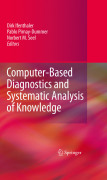
Computer-based diagnostics and systematic analysis of knowledge
Ifenthaler, Dirk
Pirnay-Dummer, Pablo
Seel, Norbert M.
What is knowledge? How can it be successfully assessed? How can we best use the results? As questions such as these continue to be discussed and the learning sciences continue to deal with expanding amounts of data, the challenge of applying theory to diagnostic methods takes on more complexity. Computer-Based Diagnostics and Systematic Analysis of Knowledge meets thischallenge head-on as an international panel of experts reviews current and emerging assessment methodologies in the psychological and educational arenas. Emphasizing utility, effectiveness, and ease of interpretation, contributors critically discuss practical innovations and intriguing possibilities (includingmental representations, automated knowledge visualization, modeling, and computer-based feedback) across fields ranging from mathematics education to medicine. These contents themselves model the steps of systematic inquiry, from theoretical construct to real-world application: - Historical and theoretical foundations for the investigation of knowledge; - Current opportunities for understanding knowledge empirically; - Strategies for the aggregation and classification of knowledge; - Tools and methods for comparison and empirical testing; - Data interfaces between knowledge assessment tools; - Guidance in applying research results to particular fields. Researchers and professionals in education psychology, instructional technology, computer science, and linguistics will find Computer-Based Diagnostics and Systematic Analysis of Knowledge a stimulating guide to a complex present and a rapidly evolving future. Indice: Preface (Dirk Ifenthaler, Pablo Pirnay-Dummer, & Norbert M. Seel) Part I - Elicitation of KnowledgeIntermezzo 1 - To Be Moved by Knowledge: Moving Knowledge Moves Knowledge About Knowing (Pablo Pirnay-Dummer & Dirk Ifenthaler) Chapter 1 - Essentials of Computer-Based Diagnostics of Learning and Cognition (Norbert M. Seel) Chapter 2 - A Functional View Towards Mental Representations (Anna Strasser) Chapter 3 - Mental Representations and Their Analysis: An Epistemological Perspective (J. Michael Spector) Chapter 4 - Multi-DecisionApproaches for Eliciting Knowledge Structure (Roy B. Clariana) Chapter 5 - The Problem of Knowledge Elicitation from the Expert's Point of View (John Vrettaros, Apostolos P. Leros, Kostas Hrissagis, & Athanasios Drigas) Part II Aggregation and Classification of KnowledgeIntermezzo 2 - Artefacts of Thought: Properties and Kinds of Re-representations (Dirk Ifenthaler & Pablo Pirnay-Dummer) Chapter 6 - Automated Knowledge Visualization and Assessment (Pablo Pirnay-Dummer & Dirk Ifenthaler) Chapter 7 - Deriving Individual and Group Knowledge Structure from Network Diagrams and from Essays (Roy B. Clariana) Chapter 8 - ASelf-Organising Systems Approach to History-Enriched Digital Objects (Andrew F. Chiarella & Susanne P. Lajoie) Chapter 9 - Performance Categories: Task-Diagnostic Techniques and Interfaces (Michael Yacci) Part III Comaprison and Empirical Testing StrategiesIntermezzo 3 - The Inner Workings of Knowledge and ItsStructure: Reasoning, Comparison, Testing, Evaluation, Decision, and Action (Pablo Pirnay-Dummer & Dirk Ifenthaler) Chapter 10 - Graphs and Networks (PeterTittmann) Chapter 11 - Abductive Reasoning and Similarity: Some ComputationalTools (Roger W. Schvaneveldt & Trevor A. Cohen) Chapter 12 - Scope of Graphical Indices in Educational Diagnostics (Dirk Ifenthaler) Chapter 13 - Complete Structure Comparison (Pablo Pirnay-Dummer) Part IV Application of Obtained ResultsIntermezzo 4 - Using Knowledge to Support Knowing (Dirk Ifenthaler & PabloPirnay-Dummer) Chapter 14 - Computer-Based Feedback for Computer-Based Collaborative Problem Solving (Harold F. O'Neil, San-hui Sabrina Chuang, & Eva L. Baker) Chapter 15 - Modeling, Assessing, and Supporting Key Competencies Within Game Environments (Valerie J. Shute, Iskandaria Masduki, Oktay Donmez, VanessaP. Dennen, Yoon-Jeon Kim, Alan C. Jeong, & Chen-Yen Wang) Chapter 16 - A Methodology for Assessing Elicitation of Knowledge in Complex Domains: IdentifyingConceptual Representations of Ill-Structured Problems in Medical Diagnosis (Tiffany A. Koszalka & John Epling) Chapter 17 - Selection of Team InterventionsBased on Mental Model Sharedness Levels Measured by the Team Assessment and Diagnostic Instrument (TADI) (Tristan E. Johnson, Eric G. Sikorski, Anne Mendenhall, Mohammed K. Khalil, & YoungMin Lee).
- ISBN: 978-1-4419-5661-3
- Editorial: Springer
- Encuadernacion: Cartoné
- Páginas: 363
- Fecha Publicación: 01/04/2010
- Nº Volúmenes: 1
- Idioma: Inglés
